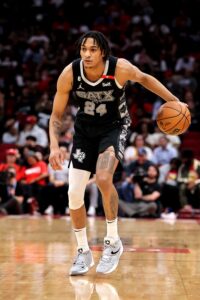The term “poison pill” doesn’t actually show up in the NBA’s Collective Bargaining Agreement, but it’s used colloquially to refer to a provision in the CBA that affects players who recently signed rookie scale contract extensions.
As we explain in our glossary entry, the so-called poison pill provision applies when a player who signed a rookie scale extension is traded before the extension takes effect.
 In that scenario, the player’s incoming value for the receiving team for matching purposes is determined by averaging his current-year salary and the salaries in each year of his new extension. His current team, on the other hand, simply treats his current-year salary as the outgoing figure for matching purposes.
In that scenario, the player’s incoming value for the receiving team for matching purposes is determined by averaging his current-year salary and the salaries in each year of his new extension. His current team, on the other hand, simply treats his current-year salary as the outgoing figure for matching purposes.
For instance, Spurs wing Devin Vassell is earning a $5,887,899 salary in 2023/24, but signed a five-year, $135MM extension that will begin in ’24/25.
Therefore, if San Antonio wanted to trade Vassell this season, his outgoing value for salary-matching purposes would be $5,887,899 (this year’s salary), while his incoming value for the team acquiring him would be $23,481,317 (this year’s salary, plus the $135MM extension, divided by six years).
[RELATED: 2023 NBA Rookie Scale Extension Recap]
Most of the players who signed rookie scale extensions aren’t realistic candidates to be traded anytime soon. But even in the event that a team does want to look into trading one of these recently extended players, the gap between the player’s incoming trade value and outgoing trade value could make it a real challenge to find a deal that works for both sides.
The “poison pill” provision applies to 14 players who signed rookie scale extensions in 2023. Here are those players, along with their outgoing salaries and incoming salaries for trade purposes:
| Player | Team | Outgoing trade value | Incoming trade value |
|---|---|---|---|
| Anthony Edwards | MIN | $13,534,817 | $36,573,920 |
| LaMelo Ball | CHA | $10,900,635 | $36,134,889 |
| Tyrese Haliburton | IND | $5,808,435 | $35,286,189 |
| Desmond Bane | MEM | $3,845,083 | $33,512,589 |
| Devin Vassell | SAS | $5,887,899 | $23,481,317 |
| Jaden McDaniels | MIN | $3,901,399 | $22,483,567 |
| Onyeka Okongwu | ATL | $8,109,063 | $14,021,813 |
| Isaiah Stewart | DET | $5,266,713 | $13,053,343 |
| Deni Avdija | WSH | $6,263,188 | $12,252,638 |
| Josh Green | DAL | $4,765,339 | $11,441,335 |
| Cole Anthony | ORL | $5,539,771 | $11,159,943 |
| Aaron Nesmith | IND | $5,634,257 | $9,658,564 |
| Zeke Nnaji | DEN | $4,306,281 | $7,261,256 |
| Payton Pritchard | BOS | $4,037,278 | $6,807,456 |
Once the 2024/25 league year begins next July, the poison pill provision will no longer apply to these players. At that time, the player’s ’24/25 salary would represent both his outgoing and incoming value.
Until then though, the gap between those outgoing and incoming figures will make it tricky for several of these players to be moved, though it affects some more significantly than others.
The small difference between Pritchard’s incoming and outgoing trade figures, for instance, likely wouldn’t be very problematic if the Celtics decide to trade him. But the much larger divide between Bane’s incoming and outgoing numbers means there’s virtually no chance he could be dealt to an over-the-cap team in 2023/24 — given that the Grizzlies have no desire to move Bane, that’ll be a moot point, but it’s still worth noting.
 11:42am: The Pacers and center
11:42am: The Pacers and center